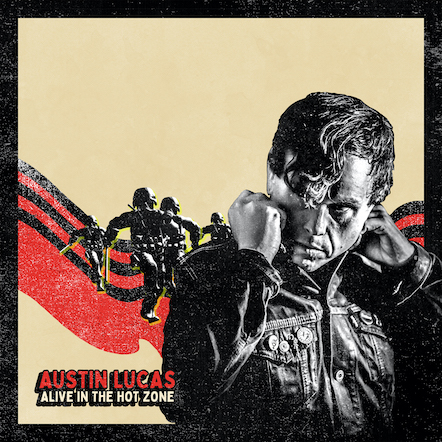
Austin Lucas ‘Alive in the Hot Zone’
CORNELIUS CHAPEL • 2020
by Kim Kelly
On his latest album, the singer-songwriter documents the tumultuous months of late spring and early summer 2020, occupying a sweet spot at the intersection of folk, punk, country, and Americana.
Every artist unlucky enough to release an album in 2020 has faced an unenviable choice about whether or not to address a certain elephant in the room, whether or not they consider themselves to be a “political” outfit. They can either try to ignore the horrors of the current administration and chance coming off as out-of-touch or ignorant, or choose to tackle the Trump era head-on, and risk feeling dated after the next geopolitical shift (remember all those Rock Against Bush compilations? Me neither, and I was their target audience). For heartland folk-punk singer-songwriter Austin Lucas, though, it was never even a question. He even went a step further by choosing to document a specific section of a specific year—namely, the late spring and early summer months of 2020, when the initial burst of the coronavirus pandemic and the Black Lives Matter uprising spurred by the killing of George Floyd and Breonna Taylor captivated the nation.
It was a move that felt entirely in character for Lucas, whose sound occupies a sweet spot at the intersection of folk, punk, country, and Americana. The Bloomington, Indiana-born artist has long sported a “This machine kills zombies” sticker on his guitar in a clear reference to Woody Guthrie’s warning to fascists, and is open about his own anti-fascist politics, as well as his background in the DIY punk scene. The punk delegation has historically tended to excel at this particular task ever since the Reagan era ushered in a generation of vital hardcore (Anti-Flag’s rollicking, venomous 20/20 Vision is an excellent contemporary example), and Lucas released an anti-fascist anthem of his own with “Already Dead,” the first single off his new album, Alive in the Hot Zone.
It has a poppy, anthemic feel that belies its sobering lyrical content. In just over three minutes, Lucas storyboards out the frustrating trajectory of slowly losing a loved one to the lure of fascist rhetoric, opening with the weary entreaty “Let’s talk, though we have nothing to say.” There are shades of Bruce Springsteen’s hangdog working-class malaise (as well as his stadium-filling sensibilities) tucked amidst the peppy chords, and Lucas nails the exasperated futility of a familiar conversation that was never going to go anywhere anyway.
CLICK HERE TO READ THE FULL REVIEW

